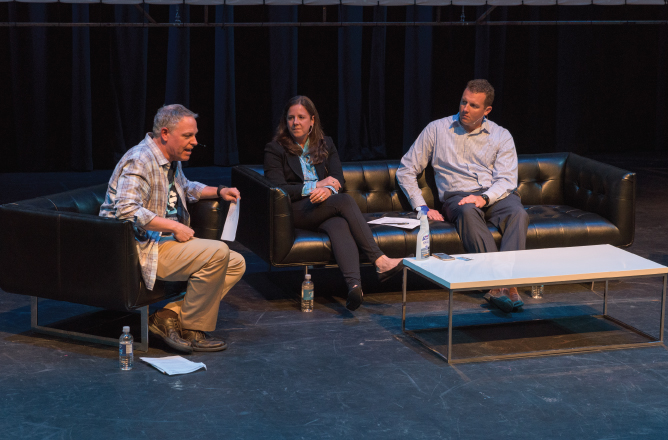Techs Talk Culture At JumpStart Event

Why didn’t Hyland Software go public way back in 2004?
At the time, the company gave a fairly simple explanation: It wasn’t going to get a good valuation due to stock market turbulence.
But last Tuesday, Aug. 15, while giving advice to a theater full of entrepreneurs at JumpStart’s third annual StartupScaleup conference, former CEO A.J. Hyland said he was also concerned about the company’s culture.
To be sure, the valuation issue was a huge reason why the Westlake-based content management software company backed away from its decision to pursue an initial public offering. Back in 2004, Hyland Software’s valuation fell by roughly half in eight months, even as the company continued to grow, A.J. Hyland said during a panel discussion called “The Business of Getting Big” — one of 37 different discussions and networking events held during StartupScaleup. The event attracted more than 1,450 people to venues scattered throughout Cleveland’s Gordon Square Arts District on Aug. 15.
But while trading anecdotes with fellow panelist Carey Jaros, chief strategy officer at Akron-based GOJO Industries, Hyland said a conference call with an analyst pushed him to finally pull the plug.
He recalled that he and his brother Chris, the company’s chief financial officer, were telling the analyst why the company missed its 2004 third-quarter revenue goal. They noted that a young project manager leading a software installation project had missed a few milestones.
“He goes, ‘Well, did you fire him?’ I said, ‘Excuse me, did you just ask me if I fired this employee because he made a couple missteps?’ He goes, ‘Yeah.’ I was like, ‘Hold on a second.’ I just put him on pause and looked at Chris and said, ‘We’re done. We’re done. This is not something that’s going to help us grow. It’s not going to be productive and healthy for us as a business.’ So we just killed it right there.”
Hyland said it’s essential for companies to maintain a strong, employee-focused culture as they grow, which can be hard as companies hire more and more people.
Without a strong culture, there’s no way GOJO — which is best known as the maker of Purell hand sanitizer — would still be growing sales by double-digit percentages each year in the not-so-high-flying soap industry, Jaros noted.
She said the company celebrates its innovators, and it gives them the flexibility and the capital to work on new products. As a result, GOJO employees are “almost maniacal” about innovation, Jaros said.
“The guy at the front desk has ideas. The woman who cleans the bathrooms has ideas. … She will come by my desk and say, ‘I was thinking’ … She doesn’t even work for GOJO and she’s coming up with ideas. It’s infectious,” she said.
For Hyland Software, maintaining the company’s culture meant fine-tuning its hiring process to find employees who would uphold the company’s values. For instance, A.J. Hyland noted that at least one top executive would meet with every new employee and make sure they realized that “everyone here is responsible for guarding the culture.” That goal also is one reason why the company requires applicants to write poems about themselves.
“That really became our psycho filter,” he said, getting laughs from the crowd at the Near West Theatre.
During other panel discussions, entrepreneurs and executives talked about how to develop talent, encourage innovation, find customers and raise capital, among other topics. Several of the panelists this year were from Silicon Valley and other regions, but in many cases talks featuring local entrepreneurs were more heavily attended, said Amy Martin, a senior partner at JumpStart, a Cleveland-based nonprofit that works with entrepreneurs.
When asked what else was different about this year’s conference, Martin noted that there were more females on the panels — and in the crowd.
“I think there were a lot more women at the event this year than last year,” she said.
This story originally appeared on Crain’s Cleveland Business.